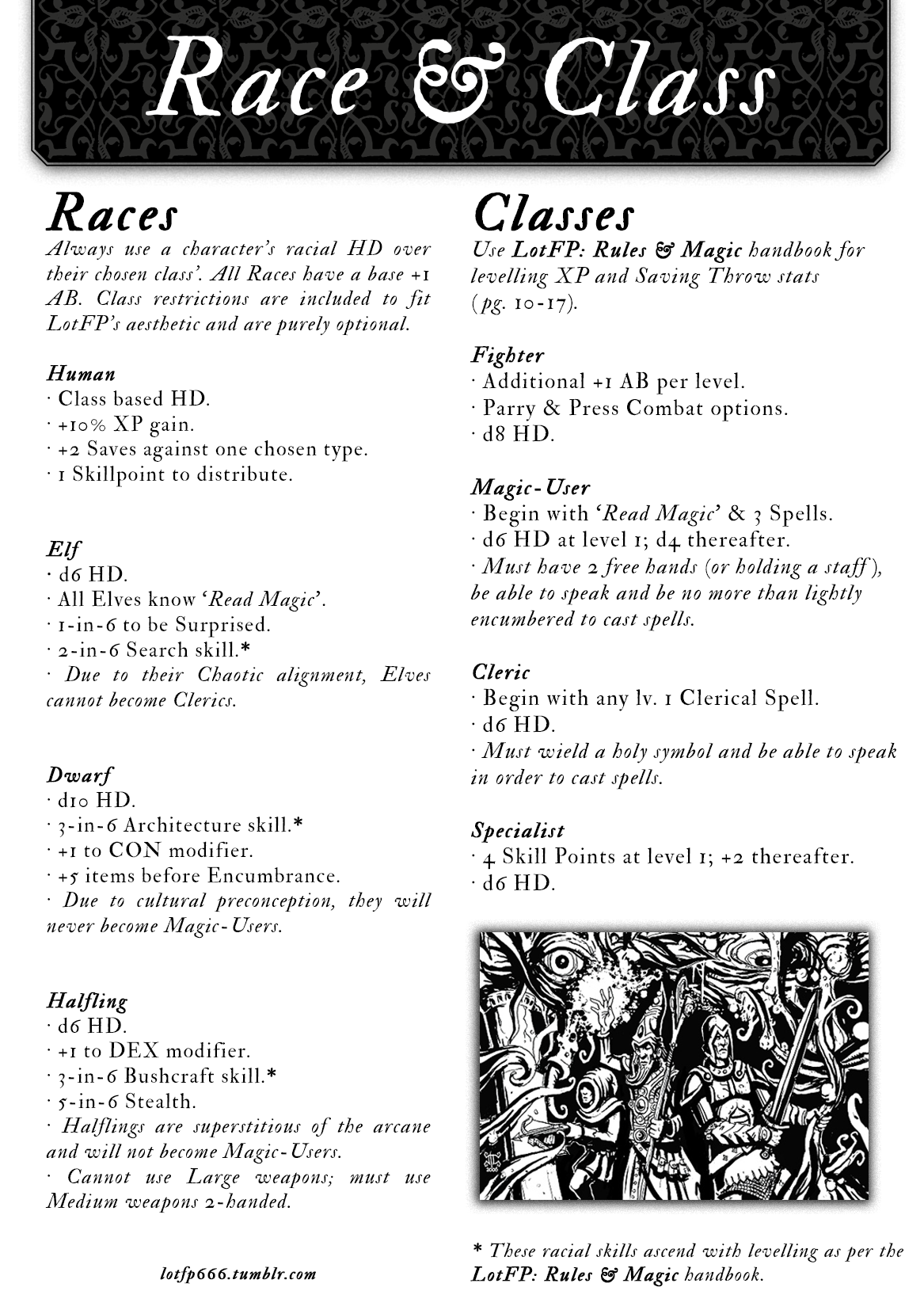One of the things that they mentioned was wanting to split character race and class, which are combined by default in LotFP. As such, I've decided to expand on a homebrew race/class system made up by lotfp666 on Tumblr (which I highly recommend for additional game materials and artwork), as well as using some additional homebrew classes that they've made. The rules they've created for separate race and class are as follows:
I have also added a couple of additional races and classes that are available in Shaxecan, as well as some general tweaks to the system.
General
- All characters use the Fighter's XP progression track. (I hate having to keep track of different XP levels and having added up all of the different class tracks in the corebook the average XP needed to get to second level is 2100, which is near enough to the Fighter for me to not care). Restrictions on the total number of levels gained at once remain in effect.
- Characters gain 10% bonus XP if they spend their loot on pointless or extravagant purchases, i.e. wild parties, fancy clothes and finery, lavish feasts etc.
- No class restrictions on Dwarves and Halflings, but Elves are still Chaotic-aligned and thus cannot be clerics. Other races will be detailed as and when relevant.
- Non-human races use their own Saving Throws as per the main rulebook. Additional races are detailed below.
- The magic system in the core rules is replaced with the system in Vaginas are Magic. This is extended to Cleric spells, who run the risk of incurring divine anger when they cast without a free slot. Elves begin play with no spells.
- Clerics begin play with 3 spells rolled randomly from the Cleric spell list in the core rules, in addition to 3 Rituals of the Faith which vary from god to god. Rituals of the Faith will never be miscast and do not need to be prepared. Their spells are recorded in their Holy Book, which functions as a spellbook. A Cleric who wishes to cast an unprepared spell must read from their Holy Book while wielding their holy symbol. Clerics gain new spells upon levelling up as Magic-Users do and can transcribe divine spells from certain sacred texts, given time and resources.
Skills
- Dwarves have a 3-in-6 Climb skill that increases as per their Architecture skill.
- Halfling Bushcraft skill is replaced with Sailing.
- Halflings have a 2-in-6 Stealth skill instead of 5-in-6. This applies to all areas, not just wilderness.
- Halflings need rations every other day.
- The Search skill has been removed. Elves substitute this with Languages.
- The general skill list has been changed and now includes the following (with thanks to Dragons Gonna Drag for inspiration):
- Animal Handling (training and commanding animals, and driving carriages)
- Appraisal (determining the value of items, trade goods and treasure)
- Arcana (determining specific magical auras and effects)
- Architecture
- Bushcraft
- Climb
- Languages
- Medicine (heals double HP when resting in a safe location; can revive characters under 1hp but they suffer a -4 penalty to all rolls until they are healed; can stabilise characters at -3hp but they will remain unconscious until healed properly).
- Riding (riding animals and driving carriages)
- Sailing (piloting watercraft)
- Sleight of Hand
- Sneak Attack
- Stealth
- Tinker
- All non-Specialist characters receive a skill point at 2nd level, and every even level thereafter. Racial skill bonuses do not stack with points already invested. These can be distributed in the following ways:
- Cleric: Appraisal, Bushcraft, Climb, Languages, Medicine, Riding, Stealth.
- Fighter: Animal Handling, Bushcraft, Climb, Medicine, Riding, Sailing, Stealth.
- Magic-User: Appraisal, Arcana, Architecture, Languages, Medicine, Stealth, Tinker.
- Specialist: No limit.
- Characters can pay to be trained in a skill, up to a certain level. The training period must be continuous and uninterrupted and each increment must be completed in order. The cost and time varies depending on the character's current skill level:
- To train a new skill to 1-in-6 - 3d6 weeks, costs 1d10 x 10sp/week. This represents an a skilled amateur level of skill.
- To train a skill to 2-in-6 - 3d6 months, costs 1d10 x 50sp/month. This represents an apprentice level of skill.
- To train a skill to 3-in-6 - 2d6 years, costs 1d10 x 600sp/year. This represents a journeyman level of skill.
- Skills generally cannot be trained past 3-in-6 - master craftsmen are busy and time is money - but certain masters of trades may agree to train a character if said character assists them greatly. This is down to the GM's discretion.
Equipment
- Characters may dual-wield weapons of Medium size and smaller. Halflings may dual-wield weapons of Small size and smaller. A character who dual-wields their weapons offensively may roll each weapon's damage and choose the better result. Dual-wielding with a dagger or other minor weapon in a character's off-hand provides a +1 bonus to Melee AC.
- Bucklers are available as equipment and provide a +2 bonus to Melee AC. A buckler does not count as an oversized item and costs the same as a shield.
Races
Orc:
- d12 HD, minimum 10hp at level 1.- Saves as Elf.
- 3-in-6 Tinker skill (ascends with levelling as per a Dwarf's Architecture bonus).
- +1 AB at level 1 and every 3rd level thereafter. This stacks with the Fighter's additional attack bonus.
Beast-Man:
- HD as Fighter.- Saves as class.
- Must be Chaotic in alignment.
- +1 STR modifier.
- 3-in-6 Bushcraft skill (ascends with levelling as per a Dwarf's Architecture bonus).
- 5-in-6 Stealth skill when in wilderness areas.
- When creating a Beast-Man the player must state which creature they represent - they then take +2 to any reaction rolls made when encountering said creature. A Beast-Man's reaction roll is always made with a -4 penalty when encountering 'civilised' peoples, unless said peoples have a good reason for interacting with them at the GM's discretion.
Classes
Mage-Engineer:
- HD and Saves as Magic-User.
- Begin play with a spellbook and 3 random spells. Casting restrictions as Magic-User and must be Chaotic in alignment.
- Gains new casting slots at half the rate of a Magic-User. For example, they receive no extra slots at level 2, and gain a second 1st level slot at level 3.
- Gain the skill Arcane Engineering at 1-in-6. This skill allows a Mage-Engineer to analyse, interact with and disarm magical traps and devices.
- Increase skills are per Magic-User in the above section.
- Mage-Engineers can attempt to create magical devices and machines, infused with spells that they know. The player should discuss what they want to create with the GM, who will have the final say on what is and isn't possible. Guidelines for the time taken and cost for doing so are below:
- Small device, i.e. clock-sized: 4d6 days, 30sp/day.
- Medium device, i.e. safe-sized: 6d6 days, 40sp/day.
- Large device, i.e. wagon-sized: 7d6 days, 40sp/day.
- Huge-device, i.e. train-sized: 8d6 days, 50sp/day.
- Colossal-device, i.e. house-sized: GM discretion. Likely a very long time and very expensive.
Cleric of Auric (Goldblood)
- HD and Saves as Cleric.
- Must be Lawful in alignment.
- Skills as Cleric.
- Begins play with a Holy Book containing 3 randomly rolled spells from the Cleric spell list in the core rules, as well as 3 Rituals of the Faith, seen below. The Rituals do not need to be prepared and will never miscast, but otherwise act as spells:
- UPHOLD THE COUNT - The Cleric can instantly determine the number of coins or gems in a container with a touch.
- HEART OF GOLD - The Cleric absorbs 1 gold coin into their flesh and heals 2d6 HP, or cures a single disease. This takes 1 round and counts as a full action.
- BALANCE THE SCALES - The Cleric focuses their will and alters the weight of a person or object that they touch. The target's weight varies from feather-light to leaden, as determined by the Cleric. The effect lasts indefinitely provided that the Cleric maintains contact and concentrates (they can take no other actions).
The above is likely to change as and when I think of new ideas or see more cool stuff that other people have made! I'm fairly happy with what I've got down so far, and it covers the bases that my players and I discussed in Session 0 with regards to what they wanted from the system and the classes they liked the sound of.
The only other thing to do is think up some adventure hooks and local personalities, as I've finished the hexmap for their starting area around Shaxecan:
EDIT 18/02/2017: Changed Halfling skill from Bushcraft to Sailing for lore reasons. Changed Halfling Stealth skill from 5-in-6 to 2-in-6. Added Halfling ration trait.
Changed Orc AB to 3rd level.



No comments:
Post a Comment